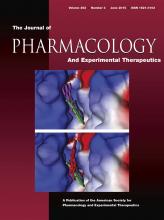Abstract
c-Jun N-terminal kinases (JNKs) participate in many physiologic and pathologic processes, including inflammatory diseases. We recently synthesized the sodium salt of IQ-1S (11H-indeno[1,2-b]quinoxalin-11-one oxime) and demonstrated that it is a high-affinity JNK inhibitor and inhibits murine delayed-type hypersensitivity. Here we show that IQ-1S is highly specific for JNK and that its neutral form is the most abundant species at physiologic pH. Molecular docking of the IQ-1S syn isomer into the JNK1 binding site gave the best pose, which corresponded to the position of cocrystallized JNK inhibitor SP600125 (1,9-pyrazoloanthrone). Evaluation of the therapeutic potential of IQ-1S showed that it inhibited matrix metalloproteinase 1 and 3 gene expression induced by interleukin-1β in human fibroblast-like synoviocytes and significantly attenuated development of murine collagen-induced arthritis (CIA). Treatment with IQ-1S either before or after induction of CIA resulted in decreased clinical scores, and joint sections from IQ-1S–treated CIA mice exhibited only mild signs of inflammation and minimal cartilage loss compared with those from control mice. Collagen II–specific antibody responses were also reduced by IQ-1S treatment. By contrast, the inactive ketone derivative 11H-indeno[1,2-b]quinoxalin-11-one had no effect on CIA clinical scores or collagen II–specific antibody titers. IQ-1S treatment also suppressed proinflammatory cytokine and chemokine levels in joints and lymph node cells. Finally, treatment with IQ-1S increased the number of Foxp3+CD4+CD25+ regulatory T cells in lymph nodes. Thus, IQ-1S can reduce inflammation and cartilage loss associated with CIA and can serve as a small-molecule modulator for mechanistic studies of JNK function in rheumatoid arthritis.
Footnotes
- Received November 11, 2014.
- Accepted March 17, 2015.
I.A.S. and L.N.K. contributed equally to this work.
This research was supported in part by the National Institutes of Health National Institute of General Medical Sciences IDeA Program [Grant P30-GM110732 (to M.T.Q.)]; the National Institutes of Health National Institute of Arthritis and Musculoskeletal and Skin Diseases [Grant R01-AR47825 (to G.S.F.)]; an equipment grant from the M.J. Murdock Charitable Trust; a US Department of Agriculture National Institute of Food and Agriculture Hatch project; and the Montana State University Agricultural Experiment Station.
- Copyright © 2015 by The American Society for Pharmacology and Experimental Therapeutics
JPET articles become freely available 12 months after publication, and remain freely available for 5 years.Non-open access articles that fall outside this five year window are available only to institutional subscribers and current ASPET members, or through the article purchase feature at the bottom of the page.
|






